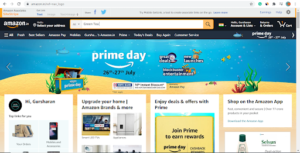Importance Of Keyword Research In An Ecommerce Store
Like any other content piece, Google and other search engines show product listings as a content piece to the relevant searchers.
But, to appear for those searches a listing should be eligible. And, in the eligibility criteria, one of the biggest factors is relevance for the keyword.
If a listing has the right keywords, images, and product that people are searching for then there are more chances that search engines will display that listing more and more.
In short, product listing and eCommerce stores also needed keywords that they can use to attract more potential buyers.
But, how and from where you can find the relevant keywords for your eCommerce store?
Here are the 4 websites that you can use to do your keyword research for your eCommerce store.
4 Websites To Do Effective Keyword Research
Amazon
Amazon is a giant eCommerce platform where millions of products are listed with a variety of keywords.
To find the relevant keywords for your products simply go to Amazon and search for the head term that describes your product name.
For instance, let’s suppose you have an eCommerce store and you want to sell green tea and honey. To find keywords related to these products you need to follow the below-mentioned steps:
- Go to Amazon

2. Search the head term “Green Tea”

3. Next to the head term (green tea) type any alphabet between A to Z. For the demo, I typed “A” and Amazon’s auto-suggestions came down in a drop-down list.

That’s how you can write different alphabets next to the head term for more suggestions and collect the keywords.
Now, Amazon auto-suggests these keywords in descending order on the basis of their search volume.
It means the keyword suggested in the first place has the maximum search volume and the keyword with the bottom position has the lowest search volume.
You can use different alphabets with your head term to find more useful keywords for your eCommerce store.
Flipkart
Similar to Amazon, Flipkart is also a big eCommerce website where you can find quality keywords with commercial intent.
Follow the same process we followed to find new keywords on Amazon. Flipkart could have better variations of your product in comparison to Amazon.
So, don’t miss Flipkart as a website to pull out more new keywords.

Google Search Results
Google is the biggest search engine in the world right now. If your product ranks on Google then you can generate a lot of sales on a consistent basis.
But to rank on Google, there are tons of factors you should be aware of. One of the factors is keyword relevance.
To find which keywords will be best for your product you should check your competitors listing.
For instance, let’s suppose you want to sell blue watches. Now, to see more variations and related terms to this keyword simply go to Google and search “Blue Watches”.

Now, click on the “Shopping” tab and see the listings. Collect some keywords from the top 10 listings and list them in your excel sheet.

This is the best way to analyze and collect some new keywords that are performing well in SERP.
Youtube
Youtube is also a great source to find some unique variations of product-related keywords.
Simply, search head terms and see the listings to collect some effective keywords.
For example, I am searching for blue watches here.

Now, some listings have appeared. I can click on these listings to find some more keywords presented in these listings.
Also, for content marketing purposes, I can search some keywords in the youtube search bar and write any alphabet between A to Z (as we did on Amazon) to see some long-tail variations.
For long-tail variation, I simply wrote my head term “Blue Watches” and then wrote two alphabets “PR” and Youtube’s auto-suggestion system showed me two variations.

Conclusion
Finding keywords on the internet is not difficult if you know the right way. Big brands run campaigns on platforms where the opportunity for sales is high.
So, always try to analyze the data and get the best out of it to achieve your business goals.
Try these 4 platforms to find more potential keywords.






